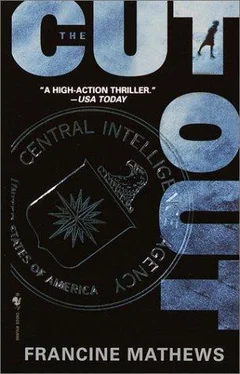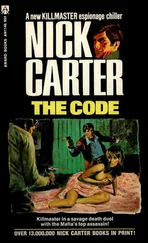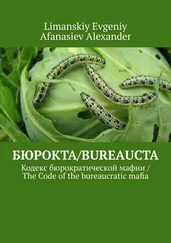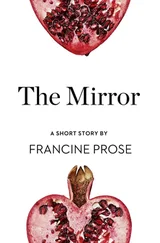The floor of the barn disintegrated in the blaze , Eric reminded her. It fell into the sheep fold below. The drop may be eight feet. You can manage it. Drop close to the wall and walk around the foundation to the right. He's mined the center, where the going looks easiest. Remember, Mad Dog, never take the path somebody carves for you. It's there for a reason.
She balanced on the ruined threshold carefully, her gun in her hand.
The floor of the barn was a mass of rubble — tumbled bits of wood and stone, the shafts of a plow, glimpsed fitfully in the starlight streaming through the gutted roof. An iron bar, set into the dirt in the far corner —
“I know,” she told him irritably. “I see it, okay?”
“Mian,” Vaclav said, his eyes on the screen, “there's an infiltration. At the tunnel entrance in the barn.”
Krucevic was at his side instantly.
“It looks like a woman.”
“A woman?” He peered at the monitor with narrowed eyes, disbelieving.
“Probably some dick with long hair.”
“Do you want me to go down?”
They were short of men. Otto and two others — Ziv Zakopan guards — had driven north to Sarajevo Airport to meet the author of the E-mail messages. They had not yet returned. Six men patrolled the barracks area where the prisoners slept fitfully; another guard was on duty in the hospital ward. He could not spare Vaclav, who alone was monitoring the new security system. If the woman had penetrated the barn, others would be climbing the cliffs. Krucevic glanced swiftly at each of the video display screens — there were four in all, facing every possible means of ascent to the fortified aerie. Blank. No triggered alarms, no red lights blazing. He slapped the panel in frustration. Where the hell were they? Nobody attempted an assault alone.
The helipad. Dabog saliva! If they had already landed — But the security monitor showed him a quiet compound, two guards patrolling with machine guns at the ready. No rotors thunka-thunked through the clear night air.
“Stay on the screens,” he told Vaclav. “I need you to follow the assault.”
From his bedroom doorway, Jozsef watched his father wheel around, gun in hand, and race down the hall to the supply closet. He knew the tunnel ended there; he had often been locked in the dark and crawling passage as punishment when he was just a small boy. A woman was climbing steadily through the earth.
Mama , Jozsef thought, you came for me at last. You came for me. And his father meant to kill her .
Eyes huge and dark in his ravaged face, Jozsef lifted his hand from the support of the door frame. He swayed an instant, dangerously. Then he tore the adhesive tape from his wrist and threw the IV feed to the floor.
The dirt walls of the tunnel were crudely carved and narrow. She crawled on her knees toward an uncertain end, a passage that could be blocked, a possible cave-in. She had no flashlight; the first law of infiltration is never tell them you're coming. The dark was so profound that Caroline was disoriented; for a time she had no idea whether the passage was in fact rising or whether she was falling with infinite slowness toward the center of the earth. She closed her eyes and crawled on.
The tunnel widens at the end so that. You can comfortably stand , Eric whispered. But for God's sake, be careful.
Caroline stopped a moment to catch her breath. The darkness was smothering.
Blood pounded in her ears, a throbbing cadence, adrenaline-fueled, and so loud it must tell the entire terrorist world, Here I am, why not I fill me ? She drew the homing device from her pocket. Soundless, vibrating, a needle point of red light — but the signal was fainter now. As though the transmitter was farther away. Apprehension knifed through her. What if I'm headed in the wrong direction? Shit .
Then her head came up. She sniffed the air. It was less heavy, less weighted with earth and disuse. She was only feet from the tunnel mouth.
She tucked the homing device away. She willed her heart to stop pounding. It ignored her. So she crawled on anyway.
Jozsef moved like a sleepwalker, like a child learning to toddle, his legs barely obeying his will. He moved out of his room toward the hospital ward three doors down the halkvay. Vaclav was staring at his surveillance monitors; the corridor was deserted.
At the entrance to the ward Jozsef stopped and clutched at the door frame. There was screaming behind him, his father's rage, a sharp cry of terror.
Mama — He fought the mad desire to run to her, to hurl himself at his father and save them all — because failure lay that way. Jozsef did not have time for failure. He drew a shuddering breath and stepped across the threshold.
There were sixteen of them strapped into beds, arms handcuffed to the iron railings. The livid glow of a fluorescent light spotlit their faces. A guard Jozsef did not know sat in a chair with a tattered copy of a Sarajevo newspaper spread open on his knees. He was in the act of rising, alerted by the screams, when Jozsef appeared.
“Go!” the boy commanded. “My father needs you. We are betrayed!”
The guard tossed aside the newspaper and reached for his gun.
“Give me the keys.” Jozsef thrust out his hand. “My father's orders.”
The man looked doubtful.
“Are you well enough?”
“The keys!” Jozsef snarled.
The man hesitated, then slapped a metal ring into his palm and dashed through the doorway. Jozsef shut the door behind him and locked it. Then he turned to face the damaged things lying in the beds.
Two old men he discounted at sight; both were obviously adrift in coma. A girl of perhaps five stared sightlessly upward while her fingers plucked at the thin sheet. A woman was moaning, the sound repetitive, maddening — she had already lost her mind. But the rest, three women, two boys his own age, and seven men — were staring at him with expressions ranging from curiosity to open hatred.
He moved toward the first as quickly as his own illness would allow, fingering the keys. No time. No time to test them all, with these people helpless and his mother's screams silenced.
“That one,” the man before him muttered in Serbian. He had bright blue eyes, impossibly blue eyes, under a mat of filthy black hair. His face was scabbed and bruised. “The one between your fingers. No — the one you just let go. It is the skeleton key.”
Jozsef's hands were shaking uncontrollably. He thrust the key into the lock, turned it to the right, and heard the click. The cuffs fell away.
“You must fight,” he said haltingly in his mother's tongue. “Fight for your life. Can you do it?”
The man sat up and rubbed his aching arms. Then he stared at the door at the end of the hall, the one Jozsef had not yet locked.
“There are guns in that storeroom. But it will be guarded.”
“Then we must draw the guard to us,” Jozsef told him. He had unlocked four more sets of cuffs; all the prisoners capable of listening were listening now.
He nodded at one of the women — dirty-blond hair chopped any which way, bright spots of color burning in her cheeks. She looked more alert than the rest.
“Scream as though someone wanted to slit your throat. Break some glass. When the guard comes through that door, we will be waiting.”
The blue-eyed man found a scalpel on a shelf. And when the woman screamed and the gun-room guard raced in with his automatic leveled, the man stood ready behind the door.
The guard fell with the scalpel through his neck.
Jozsef steadied himself against a bed. Stars were exploding behind his eyes. I must not faint . The blond woman's hand gripped his shoulder. He saw, as from a great distance, that three of her fingers were missing. In her other hand she held a knife.
Читать дальше







![Микки Спиллейн - Death of the Too-Cute Prostitute [= Man Alone]](/books/437201/mikki-spillejn-death-of-the-too-thumb.webp)




